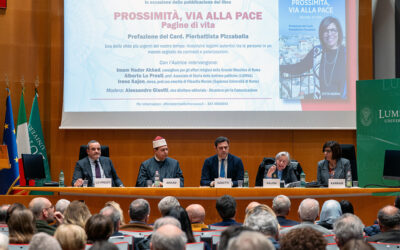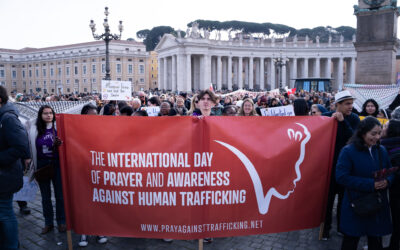 “It was not a conference, but an experience and, to be more precise and in-tune with the event, I would call it an experience of tikkun, reparation, as explained in the Jewish tradition,” writes Roberto Catalano, from the Focolare’s Centre for Interreligious Dialogue on his return from Salerno.
“It was not a conference, but an experience and, to be more precise and in-tune with the event, I would call it an experience of tikkun, reparation, as explained in the Jewish tradition,” writes Roberto Catalano, from the Focolare’s Centre for Interreligious Dialogue on his return from Salerno.
The three-days of “study, listening, prayer” (24-26 November), looked at several topics, from anti-Judaism throughout the centuries, to the recognition of Israel, the Holocaust, the improvement in Jewish-Christian relations since the Second Vatican II, and the Way to the Tikkun Olam. All the presentations were done in two parts: Christian and Jewish. An occasion, the first of its kind in Europe, which marked a step of “reparation of relations between the Jewish and Christian traditions that in these last two thousand years have experienced tragic moments,” writes Catalan. “The relations between Jews and Christians have for centuries suffered the consequences of these events that guided the history of humanity towards tragedies culminating in the Holocaust. Recently, as we know, the conciliar declaration Nostra Aetate and, then, people like John Paul II and Cardinal Martini, who is repeatedly cited by Jews and Christians alike, have taken up the threads of the relationship and have contributed to a decisive rapprochement by the Christians.”
Planned initially for bishops and diocesan delegates for ecumenism and inter-religious dialogue, it was then opened out to all the coordinators of dialogue, and others, Jews and Christians, secular and religious. There were more than 400 present, including 50 priests: there were Christians mainly from Italy, and Jews from Italy, Israel, and the US.
 “The conference of Salerno was an important step on this journey. We have spoken very clearly on one side and the other without ignoring history but being realistically optimistic. It was impressive to see Catholic priests, bishops and cardinals sitting next to rabbis. The Jewish kippah mingled with the red caps of the bishops. Fraternity was the queen of these days: the impression was to have begun a joint project. Speaking with Joseph Levi, the chief rabbi of Florence, we were saying that even just ten years ago it would have been unthinkable to hold an event like this.
“The conference of Salerno was an important step on this journey. We have spoken very clearly on one side and the other without ignoring history but being realistically optimistic. It was impressive to see Catholic priests, bishops and cardinals sitting next to rabbis. The Jewish kippah mingled with the red caps of the bishops. Fraternity was the queen of these days: the impression was to have begun a joint project. Speaking with Joseph Levi, the chief rabbi of Florence, we were saying that even just ten years ago it would have been unthinkable to hold an event like this.
 The story goes on and, contrary to what the media would have us think or what still tragically happens in different parts of the world in these times, the tikkun of the world has begun or perhaps progresses because it is now enriched with a new dimension, the common contribution of Christians and Jews. It is necessary to have the desire to work together for fraternity: to recompose that family to which we all belong. This was stated so effectively in Nostra Aetate: “All nations are one community and have one origin, because God caused the whole human race to dwell on the whole face of the earth. They also have one final end, God”(NA 1).”
The story goes on and, contrary to what the media would have us think or what still tragically happens in different parts of the world in these times, the tikkun of the world has begun or perhaps progresses because it is now enriched with a new dimension, the common contribution of Christians and Jews. It is necessary to have the desire to work together for fraternity: to recompose that family to which we all belong. This was stated so effectively in Nostra Aetate: “All nations are one community and have one origin, because God caused the whole human race to dwell on the whole face of the earth. They also have one final end, God”(NA 1).”




0 Comments